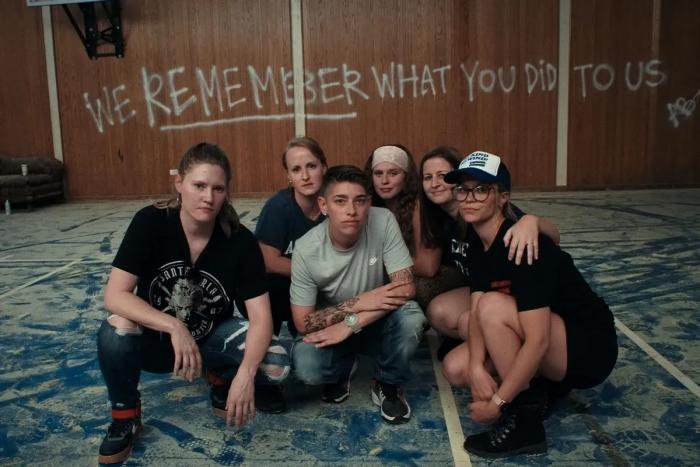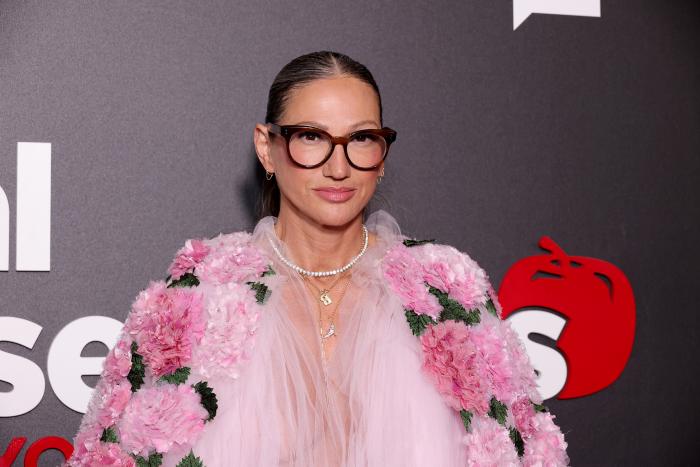

'The Program' Is a Powerful True Crime Reckoning for the 'Troubled Teen' Industry
By Alison Lanier | TV | March 12, 2024 |
By Alison Lanier | TV | March 12, 2024 |

In the militaristic, abusive, unregulated “school” where teenaged Katherine Kubler was imprisoned for fifteen months, many books were banned. But one book that wasn’t was The Count of Monte Christo—the story of a man falsely imprisoned by his enemies who escaped to wreak revenge on those who’d wronged him. Katherine took that book as a model: when she got out, she promised herself she’d make a documentary to expose the abuses she and others endured. And with The Program, now streaming on Netflix, she’s done just that.
In the three-part series, Katherine—now a successful filmmaker—returns to Ivy Ridge, the upstate New York institution for “troubled youth” where she was imprisoned for over a year, alongside other survivors of the “school” who spent months or years as prisoners there in the early 2000s. Records blanket the floors of the abandoned building, and anguished messages in spraypaint line the walls, including “They tried to murder children’s souls here.” The survivors recount their experiences—and watch them, after the team uncovers a box of security camera footage all stored and labeled on DVDs.
The footage and the testimony is horrific—physical beatings, torture, starvation, solitary confinement, sexual abuse. Imprisoned teens were not allowed to speak, to smile, to fart without permission, to go to the bathroom unobserved, to go outside, to look out windows … The absurdity of it is part of the cruelty. There are the programs where “transportation services” appear in the middle of the night to handcuff and kidnap troublesome teens from their homes. Katherine was abducted from her previous high school after getting caught with a Mike’s Hard Lemonade.
Through an impossible program of points and demerits, teens are meant to earn back their right to be treated as human beings. Needless to say: There was no actual education provided here.
One previous teenage prisoner recalls a riot he helped mastermind to help the kids escape; instead, he ended up temporarily in the country jail, which he describes as a “five-star Hilton” in comparison to Ivy Ridge.
All this was meant to serve as part of the “troubled teen” industry that still thrives today: expensive “tough love” programs where rebellious, depressed, or otherwise “difficult” teens were and are abused in the name of “fixing” them. I’m using a lot of quotes here because the jargon is horrifically transparent when you know what those phrases actually mean in practice.
Championed by Nancy Reagan, the troubled teen industry is now more familiar as programs like “wilderness camps.” Just this week I ran into mention of another one of these programs on the true crime podcast The Rise and Fall of Ruby Franke; Franke sent her eldest son to one such program just a few years ago and documented the process on her YouTube channel to over two million followers, praising the program for its effectiveness. These programs are still rampant today, especially in the American Southwest and especially in Utah, where the state touts them as a tool for bringing in out-of-state money.
These programs are descendants of Synanon, and the high-control methods will be recognizable to anyone who watched Born in Synanon or are otherwise familiar with the cult. Their militaristic wilderness drilling of members’ children is blatantly transposed to the cult to the “troubled teen” industry.
The cohort at the center of the film is composed of the survivors of Ivy Ridge, and the toll it’s taken on their lives is painfully obvious. You catch glimpses in the adult Katherine of the exuberant, playful child that we see in her home videos. And you see, in the videos immediately following her incarceration, how that spark had absolutely gone out. It’s a relief and a triumph to see her visibly reclaiming it through the making of the series, meeting trauma with righteous joy.
The ex-“students” track down a number of the adult administrators/abusers who worked at Ivy Ridge while they were there. Many of these adults still live in the small town where Ivy Ridge was situated. It’s part of the town’s history to the point that, while discussing Ivy Ridge in a local diner, the film crew is asked, not very politely, to leave midmeal. No one likes looking at this history, least of all those involved.
In one rewarding moment of catharsis, one of the cohort, Alexa, discovers her intake file and her negative drug test taken at the time—a drug test which an administrator told that student’s parents “lit up like a Christmas tree.” Alexa spent years in incarceration, forced to atone for her drug use, under the pejorative nickname of “crackwh*re” given her by staff, while her parents wrote huge checks for her “tuition.” She was fifteen when she was committed. Alexa takes a copy of that intake form and puts it in the administrator’s mailbox with the note: “I’m not a crackwh*re, but you’re a liar.”
And, in a pattern that would be repeated time and time again, that administrator calls Alexa to say they don’t remember doing that.
The cliché of banal evil covers a lot of ground in that regard. The survivors’ memories and descriptions of these adults’ behavior and abuses are horrifically vivid. One talkative ex-administrator expressed sympathy for “what you girls went through” (this from an administrator who engaged in frequent and “thorough” strip searches of the teen girls now speaking to her as adults) while the sanctimonious air of someone who doesn’t think they have anything to apologize for.
It’s somehow both astonishing and horribly predictable. These terrible things happened—but it wasn’t really their fault, these ex-administrators believe. They were just doing their jobs.
In the end, the docuseries is a call to action in the face of this still-thriving industry based on child abuse: the abuse of a child is the business of anyone who knows about it, recites Katherine, and now you know. That call is already beginning to show some signs of response, but not nearly enough.
← Reddit Asks the Question: 'What's Your Greatest 'I Told You So' Story?' | Kevin Williamson Will Direct 'Scream 7' with Neve Campbell Returning →
More Like This
I Think I’m Done with True Crime For Now
Review: It's Time for Yet Another Netflix True Crime Series with 'Dig Deeper: The Disappearance of Birgit Meier'
Review: Netflix’s Newest True Crime Series ‘The Raincoat Killer’ Looks Into the Case of an Infamous South Korean Serial Killer
Review: ‘What Happened, Brittany Murphy?’ Is a Ghoulish Example of Modern True Crime Exploitation At Its Absolute Worst
The Secret Villain of 'The Lady and the Dale' Is Tucker Carlson's Dad

Jenna Lyons Has Conditions For ‘Real Housewives’ Return
This Week On ‘Selling Sunset’: Irreconcilable Differences
Huey Lewis Was Inspired By 'Mamma Mia' For His Next 'Career Event'
Paramount+ Is Getting Cues From David Zaslav
Yorgos Lanthimos Reteams with Emma and Viggo Goes West In Three Trailers
Kristen Stewart Will Never Make an ‘Algorithmic’ Marvel Movie
More Like This
I Think I’m Done with True Crime For Now
Review: It's Time for Yet Another Netflix True Crime Series with 'Dig Deeper: The Disappearance of Birgit Meier'
Review: Netflix’s Newest True Crime Series ‘The Raincoat Killer’ Looks Into the Case of an Infamous South Korean Serial Killer
Review: ‘What Happened, Brittany Murphy?’ Is a Ghoulish Example of Modern True Crime Exploitation At Its Absolute Worst
The Secret Villain of 'The Lady and the Dale' Is Tucker Carlson's Dad
Reviews